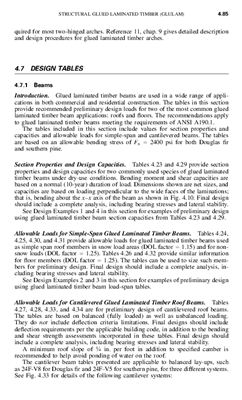McGraw-Hill, 2002, 750 Pages
Winner of Association of American Publisher's 2001 Professional/Scholarly Publishing Division Annual Awards Competition.
Chapter 1 provides a basic introduction to the structure and properties of wood as an engineering material. Subsequent chapters discuss the unique design and construction characteristics of each glued engineered wood composite product. Chapter 2 focuses on wood structural panels. Chapter 3 explains how wood structural panel products can be combined to create box beams, stressed skin panels and structural insulated panels. Chapter 4 describes Glulam - structural glued laminated timber. Prefabricated wood I-Joists and engineered rim board are discussed in Chapter
5. Chapter 6 provides an information on the structural composite lumber. Chapter 7 describes how wood framed shear walls and diaphragms can be used to resist the lateral forces induced by wind and seismic events—technology which is essential to the design of any wood framed building. And since any building design is only as good as the connection detailing, Chapter 8 provides a comprehensive review of fasteners and connections typically used with glued composite products. Some of the questions most commonly posed to the APA technical staff relate to product protection—how to provide maximum durability with minimum maintenance. Chapter 9 discusses treatments and finishes, Chapter 10 describes fire- and noise-related systems, and Chapter 12 focuses on designing and detailing for permanence. These chapters provide the most up to date industry recommendations on these topics. The next technology breakthrough on the horizon will combine glued wood composite products with other technologies, such as fiber-reinforced polymers. These products of the future, commonly called advanced engineered wood composites, are discussed in Chapter 11.
Winner of Association of American Publisher's 2001 Professional/Scholarly Publishing Division Annual Awards Competition.
Chapter 1 provides a basic introduction to the structure and properties of wood as an engineering material. Subsequent chapters discuss the unique design and construction characteristics of each glued engineered wood composite product. Chapter 2 focuses on wood structural panels. Chapter 3 explains how wood structural panel products can be combined to create box beams, stressed skin panels and structural insulated panels. Chapter 4 describes Glulam - structural glued laminated timber. Prefabricated wood I-Joists and engineered rim board are discussed in Chapter
5. Chapter 6 provides an information on the structural composite lumber. Chapter 7 describes how wood framed shear walls and diaphragms can be used to resist the lateral forces induced by wind and seismic events—technology which is essential to the design of any wood framed building. And since any building design is only as good as the connection detailing, Chapter 8 provides a comprehensive review of fasteners and connections typically used with glued composite products. Some of the questions most commonly posed to the APA technical staff relate to product protection—how to provide maximum durability with minimum maintenance. Chapter 9 discusses treatments and finishes, Chapter 10 describes fire- and noise-related systems, and Chapter 12 focuses on designing and detailing for permanence. These chapters provide the most up to date industry recommendations on these topics. The next technology breakthrough on the horizon will combine glued wood composite products with other technologies, such as fiber-reinforced polymers. These products of the future, commonly called advanced engineered wood composites, are discussed in Chapter 11.

